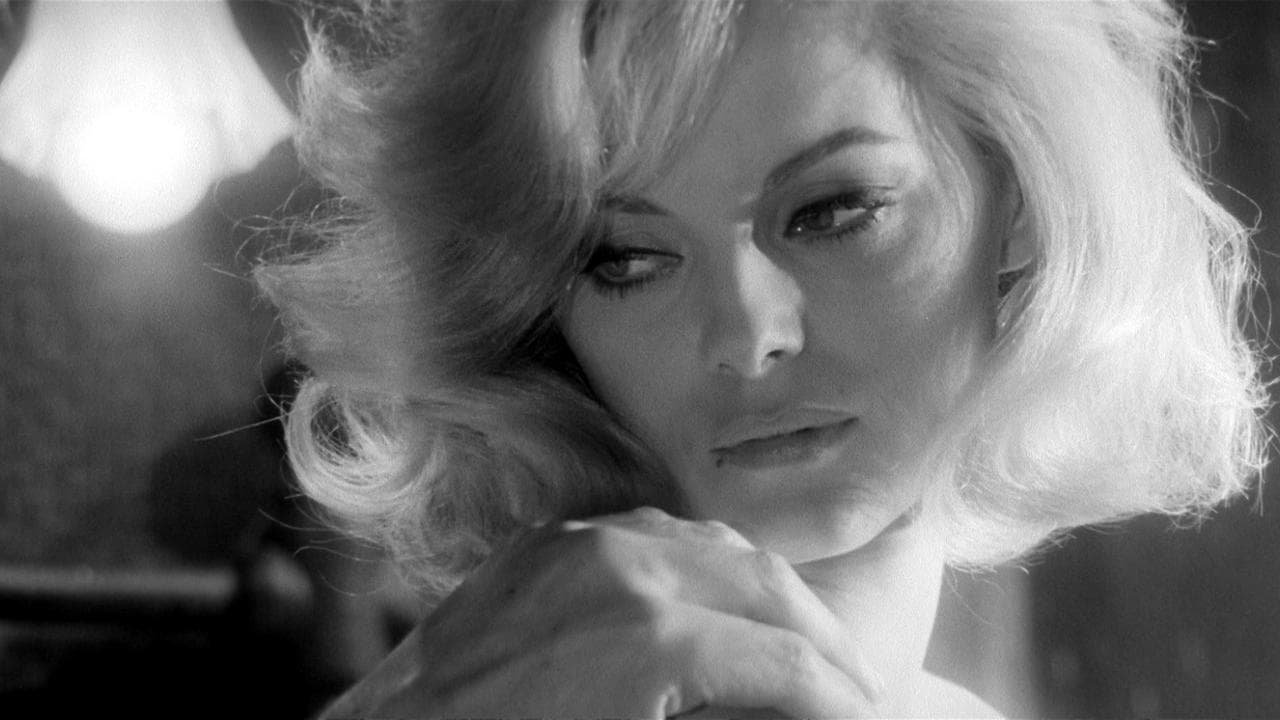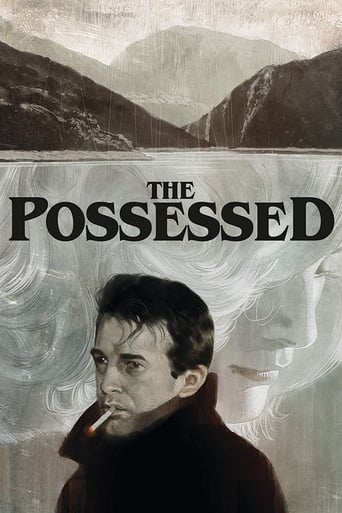Flyerplesys
Perfectly adorable
Dorathen
Better Late Then Never
Ezmae Chang
This is a small, humorous movie in some ways, but it has a huge heart. What a nice experience.
Darin
One of the film's great tricks is that, for a time, you think it will go down a rabbit hole of unrealistic glorification.
Bezenby
This early giallo has the look of Bazzoni's later The Fifth Cord and the mood of his last film Footprints On the Moon, and once again the director impresses with a mix of noir-ish visuals and people thinking a lot.Bernardo is a burned out writer who, following a failed relationship, heads to a hotel on the edge of a lake where he was once infatuated with a maid named Tilde. He plans to take their relationship further, but only if he can find her. He should have probably asked where she was while he was on the phone booking a room because it turns out that Tilde committed suicide the previous winter. Maybe he booked through Trivago or something and didn't get the chance to speak to a real person.Someone in town confides in Bernardo that there's a rumour going around town that as well as ingesting poison Tilde must also have accidentally slashed her own neck with a knife too, which sets off Bernardo on a quest to find out what really happened to this woman he was technically stalking. Seriously - at one point we get a flashback to Bernardo spying on Tilde getting some from a mysterious horny stranger. The mystery deepens as certain characters in the hotel start behaving strangely. First off there's the owner's daughter Irma, who is upset that the family's reputation is shattered, then there's her brother Mario and his weird wife who barely talks and walks around the lake at midnight, then there's the owner himself, whose happy, servile façade begins to slip as Bernardo goes snooping around the place.Although there's not a lot of action in this one the general moodiness of the piece is cranked way up. Just like the brilliant Fifth Cord, Bazzoni uses light sources a lot here and often has his actors standing in front of harsh lighting, saving the weirdest light tricks for when Bernardo is either fantasising about the suspects motives or having one of many vivid dreams. There's quite a lot to compare to Footprints on the Moon as well, with one lonely character in a deserted holiday resort trying to figure some strange puzzle out.For a really early giallo, and for Bazzoni's debut, this is a slick, well made film. It would be a good double-bill with Libido and The Third Eye (an early giallo with all the nastiness in place).
m-sendey
A young writer Bernardo (Peter Baldwin) decides to come back to a small town, set nearby a lake, where he had previously stayed and met a attractive maid and waitress – Tilde (Virna Lisi). The place is desolate then, as the action takes place in winter and the tourist are not particularly interested in this place at this part of the year. Bernardo is in search for peace and quiet and this is why he has an intention of having a rest there and working on his new book. However, after some time it dawns on him that, actually subconsciously, he wants to meet the beautiful waitress. He plans to rediscover her and starts searching, after which he is informed by the owner of the hotel about her mysterious death… This is often considered to be one of the earliest examples of giallo genre, along with Blood And Black Lace (1964). In spite of this fact, this cannot be considered, just like later effort by Bazzoni, masterful Footprints On The Moon (1975), to be a typical mystery that made a pattern for all films of this genre, as it differs drastically. In addition to this, the flick is more likely to remind Blow Up (1966) by Antonioni than The Bird With Cristal Plumage (1969) or Deep Red (1975) by Argento. The main character appears to be lost in the world of his own illusions and enquires himself what is real and what is just his imagination, just like David Hemmings in Antonioni's masterpiece. While Michelangelo Antonioni is more interested in general subject of perception and human identity in the world, in which being a witness is a very relative phenomenon, Bazzoni avoids such topics and focuses on delving into Bernardo's mind. Our protagonist himself is not a witness, he's just implicated in a twisted affair surrounding this town. To render psychological aspect even more visible and more articulate, the director utilizes a very slow pace and we can hear our character's thoughts. Owing to this, the viewer is able to follow all the vacillations of the main character and follow all possible ways of Tinde's demise accompanying this mystery envisioned by Bernardo. What is more, Bazzoni exploits black-and-white cinematography which makes things even more fascinating. To sum up, all these elements give it a very distinctive look and it is far from a simplistic murder mystery and the film becomes a sort of a psychological drama. At the end, nothing seems to be concluded and unraveled in detail. In spite of the fact that Bernardo's explanation is the most probable, there are plenty of additional subplots which suggest that many things remain obscure and inexplicable. Thanks to an exceptional editing, chilling sequences of dreams and flashbacks merged together, the ensemble looks terrific.Therefore, nothing is certain in this flick. The whole plot is shown from the Bernardo's point of view, along with his visions and dreams. This render everything not only a murder mystery, but also a great psychoanalysis of the Bernardo's mentality, exposing all his fears, desires and his vague relationship with Tilde whose personality we get to know through his memory. Thus, this subjective nature and unusual perspective make it so extraordinary and riveting. The script itself isn't the biggest advantage of this picture. If it was made by somebody else, it would possibly be a flop. Fortunately, on account of tremendous direction by Bazzoni, his visual style, exquisite taste for creating adequate atmosphere of anticipation and ambiguity, The Possessed (1965) (La donna del lago) is a true gem.The cast is nothing special, but all of the actors manage to achieve a satisfying level of acting artistry. Peter Baldwin, a little known television actor, gives a quite decent performance. There are a couple of familiar faces: such as Phillipe Leroy, known for his roles in Yankee (1966) by Tinto Brass, and Salvo Randone from Investigation of a Citizen Above Suspicion (1970) by Elio Petri. Their roles are rather a minor ones, as Peter Baldwin is the most important character and the action revolves around him.Overall, La donna del lago (1965) might not be as visually striking as gorgeous Footprints On The Moon (1975), nonetheless it's a very impressive little movie that should be more known than actually it is. The story itself is nothing really new, but the way it is executed makes this one refreshing and worth a look. Luigi Bazzoni attaches a great importance to a psychological aspect of characters in the film and owing to this outshines many other flicks in its genre. Now, it remains only a hidden gem and sadly it seems there is no possibility to popularize it in the nearest future. Pity. This deserves to be more prevalent.
gengar843
First, let's get this out of the way... there are no zombies! No zombie-like characters. No people under the mysterious influence. It's a simple murder mystery with lots of intentional confusion.Second, let me be pretentious for a minute. The dream scenes were stylish, but overwrought. The plot was thin and padded. Characters went nowhere.OK, so what's so great? Honestly, I don't know what to tell you. The acting wasn't first-rate. The locations were passable. The directing was scattershot. The ending was too pat.But... if you didn't read this review first, you might think you were to see a ghost story. So, from that point of view, it's both tense and a letdown. Tense, because you're waiting for the kick in the gut, a letdown because it's just another mad hatter on the loose.Now, I saw the 82m cut, not the purported 95m, so maybe there were some boffo scenes that I missed. Probably not.Hey, is it "proto-giallo"? I watched "Four Flies on Grey Velvet" right before this, so I'll say "maybe." 1965 isn't exactly "proto."
The_Void
The Lady in the Lake is often seen as a precursor to the Giallo style that would reach it's peak in the early seventies; and I can certainly see why. However, I would say that the film is closer to a supernatural mystery film than a Giallo and it also shares a lot in common with the popular American film noir style; stemming from it's picture, execution and subject material. The film is very much of the high quality variety and director Luigi Bazzoni takes time and a lot of care to ensure that the film is haunting and mysterious as possible - which pays dividends as the plot starts to pan out. We focus on Bernard; a writer who goes to spend some time in a dilapidated hotel where he spent some time the previous year. Once he gets there, he begins searching for Tilde; a young maid he fell in love with during his previous visit, but he's surprised by the news that Tilde killed herself. However, it would appear that there is more to the apparent suicide as Bernard is shown a picture suggesting she was pregnant...The film is directed by Luigi Bazzoni, who go on to make one of the best seventies Giallo's with the excellent The Fifth Cord as well as one of the oddest genre films with Footsteps in 1975. There's also a writer's credit for Death Laid an Egg writer-director Giulio Questi, so rather unsurprisingly - The Lady of the Lake is a rather bizarre film! It starts off simple enough and the first half of the movie is pretty easy viewing, but then things start to get a bit stranger in the second half and it becomes easy to loose the plot. It's lucky then that there's more than enough to keep the audience otherwise entertained. The cinematography is absolutely gorgeous and the black and white picture allows the director to capture a real macabre and moody atmosphere. The town in which the film takes place is a masterpiece within itself - the ghostly local population in particular is memorable. The plot comes back together towards the end and the film does give closure to its central plot line. Overall, The Lady of the Lake will probably not please all viewers; but it's a very well made mystery and anyone that considers themselves a fan of Italian cinema should check it out!

